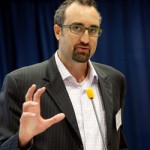 On August 18, a group of South African and international legal experts will work with South African filmmakers to better understand their rights as users as well as creators under copyright law. The meeting will focus on actions filmmakers can take to use and expand user rights in South Africa that are necessary to fully enable the vibrant filmmaking industry that already exists, and to support emerging artists. The meeting follows, and will report on, recent research showing that South African documentary filmmakers do not understand their rights to quote the work of others within their filmmaking, and the result is a reduction in the production and circulation of local films.
On August 18, a group of South African and international legal experts will work with South African filmmakers to better understand their rights as users as well as creators under copyright law. The meeting will focus on actions filmmakers can take to use and expand user rights in South Africa that are necessary to fully enable the vibrant filmmaking industry that already exists, and to support emerging artists. The meeting follows, and will report on, recent research showing that South African documentary filmmakers do not understand their rights to quote the work of others within their filmmaking, and the result is a reduction in the production and circulation of local films.
Copyright laws and free expression principles are at once interdependent and in potential conflict. Copyright laws help promote free expression by providing incentives for the production of new creative works through an exclusive right of reproduction. But taken to the extreme, exclusive rights could inhibit the production of new expressive works that depend on the incorporation and transformation of prior expression. Imagine, for example, that a documentary film about the history of the ANC was not allowed to incorporate any historical or news footage about the organizations because the copyright owner of those image would not permit it.
Thus, copyright laws normally contain what the U.S. Supreme Court has referred to as “built-in [free expression] accommodations” in the form of rights of users to quote copyrighted material in new works without permission of the copyright owner in certain circumstances.
Recent research on the operation of these “user rights” in documentary film, performed by South African Filmmakers in partnership with American University Washington College of Law professors Peter Jaszi and Sean Flynn, concludes that South Africa’s copyright law contains important user rights, but that “these aspects of South Africa’s law are not well known among filmmakers.” “When South African filmmakers exercise their rights to use copyrighted material without license,” the Report continues, “they most frequently do so quietly, reluctantly and under an assumption that their actions are illegal.” Ultimately, this state of affairs has led to self censorship to the detriment of the public filmmakers seek to serve.
A similar state of affairs was found among documentary filmmakers in the U.S. over a decade ago. U.S. filmmaker organizations explained:
“[D]ocumentarians believe that their ability to communicate effectively is being restricted by an overly rigid approach to copyright compliance, and that the public suffers as a result. The knowledge and perspectives that documentarians can provide are compromised by their need to select only the material that copyright holders approve and make available at reasonable prices.”
These conclusions led U.S. filmmakers to craft and publish the Documentary Filmmakers’ Statement of Best Practices in Fair Use. The Guide “makes clear what documentary filmmakers currently regard as reasonable application of the copyright ‘fair use’ doctrine” . . . to help filmmakers use it with confidence.”
South African filmmakers cannot produce a best practices doctrine on ‘fair use” because South Africa’s law – which is dated and under a process of revision currently – because there is no fair use doctrine as such in the local law. Given that copyright law reform is on the agenda, it is of paramount importance that filmmakers and other key user groups – including libraries, educational institutions and consumer organizations — study the fair use doctrine and other models of user rights other countries to determine what change will be best here.
In addition, there are important user rights in the law that filmmakers and other users of copyright material need to understand and use. That is why filmmaking organizations responded to their research with a recommendation that they “Develop a consensus ‘best practices’ document explicating copyright users’ rights in documentary filmmaking.” We pledge to help with that process.
Peter Jaszi, AUWCL
Sean Flynn, AUWCL
Tobias Schonwetter, UCT, Creative Commons
Andrew Rens, UCT




